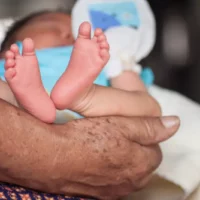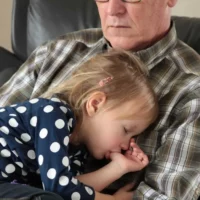In real life both the maternal and paternal grandmother holds a special place in the structure of most families. Yet with clichés, old wive’s tales and folklore often suggesting the maternal grandmother should be top of the love chain when it comes to family hierarchy, should we listen, or brush this off ? Should we ever serve this attitude as a vehicle for the formation of family and cultural meaning, or is it disrespectful to the other grandmother?
Maternal grandparents are the mother’s parents. Paternal comes from a French word meaning “of the father,” so the paternal grandparents of a child are their father’s parents. (1)
All four of my grandparents are deceased, and as a Scottish lass living abroad, I often think about family, ancestry and roots. There is a fun song from Scotland called ‘Ye canny shove yer grannie aff a bus!’
The lyrics jab at the cultural identity of family trees, suggesting that the grandmother from the mother’s side of the family is more important; ‘Cause she’s yer mammie’s mammie.’
A further verse suggests ‘Ye can shove yer other grannie aff a bus- cause she’s just yer daddie’s mammie’. The purpose of the song is to raise sarcastic fun, of course! But with studies now proving that there is a strong genetic bond between maternal grandmothers and their grandchildren, the unique role this lady brings to the family table may be more than once thought.
Maternal Grandmother DNA Mystery
According to scientists, apart from their love and affection, there is something remarkable we get from our maternal grandmothers.
Genes are simple inherited units composed of DNA. Grandparents share an average of 25 percent of their DNA with their grandchildren, with the exact amount depending on the DNA swap. We inherit our genes from both our male and female grandparents, but it is maternal grandmothers who have the greatest degree of control on the offspring. (3)
This is because there are different types of DNA chromosomes in our cells, are some in compartments called the nucleus in our cells. Other mitochondria (mtDNA) in other areas make energy, almost like mainstays, for our cells. The mitochondrion has its own DNA to do its work.
The catch is that from their mother, children get all of their mtDNA. It’s not the normal split of 50/50 between mom and dad. In reality, if we include mtDNA, a child always shares a little more from mom’s side.
To throw more into the mix, a doctoral student in the Department of Biological Anthropology of Cambridge has found out that grandmothers’ female “X” sex chromosome is not inherited equally between their grandchildren, which may explain why some do better with each grandmother than others. (4)
The Rank Of Maternal Grandmothers
Discoveries and theories support the idea that grandmothers have played an important role in human evolution. The reason human females live far past menopause is generally assumed to be so that grandmothers can spend their resources in raising the offspring of their children, rather than risking their own further pregnancies.
Maternal grandparents tend to be closer to grandchildren than the paternal sometimes because despite advances in gender equality, mothers are still likely to guide the activities of their children. Communication with their own parents may be of increased importance to them.
Geographical closeness is important, a grandparent’s employment status, health, economic status, and their personality can also be influential factors. A cute survey, also from the UK showed the main reasons for kids preferring either grandma were that she spoils them (79 percent), they always get their own way with her (50 percent), and she’s a better cook (20 percent).
Note to grandmothers: there are shortcuts to ranking favorite! (5, 6)
The Grandmother Hypothesis
The “grandmother hypothesis” indicates that all grandchildren benefit from their early childhood involving any of their grandmothers. Studies therefore appear to have failed to support the theory with clear or consistent evidence, that either grandmother should be the favorite, despite DNA being closer. (4)
Nowadays with high divorce rates, multigenerational living and even second marriages, anything goes when it comes to family.
Nurturing a meaningful relationship with any grandparent is always a great privilege. They inspire and precipitate our accomplishments. Our lives are encouraged by them, and so is our emotional and spiritual development.
Perhaps we should all simply feel blessed -whilst any of our grandparents are still around.


